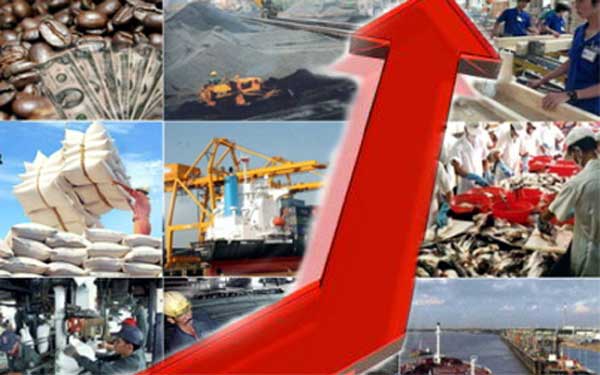2017—a year of remarkable success
 |
Prime Minister Nguyen Xuan Phuc said that the Vietnamese economy has developed well in almost all fields. All 13 economic goals set forth were accomplished and exceeded, contributing to developing an exciting business and investment environment and consolidating people’s confidence.
Notably, GDP growth hit 6.7 per cent, the highest in the past decade. Macroeconomic performance was stable. Inflation was brought under control, while exports surged sharply and the industry recovered at a remarkable pace.
The number of newly-established businesses was estimated at 126,860, setting a new record against the 110,100 recorded in 2016 with a total value of newly and additionally registered capital of over VND3,172 trillion (equivalent to $139.43 billion) and 26,448 businesses resumed operation.
The FDI sector made increasingly significant contributions to socioeconomic development. The amount of registered FDI capital set a new record since 2009 with $35.6 billion. Disbursed capital hit $17.5 billion, the highest figure over the last ten years.
The business environment and national competitiveness index both improved remarkably. According to the World Bank’s Doing Business 2018 report, Vietnam ranked 68th among 190 economies, up 14 ranks against 2017 and 30 ranks against 2012. The World Economic Forum (WEF) also ranked Vietnam 55th overall, up five places from last year.
Earlier, the Global Innovation Index 2017 (GII 2017) of World Intellectual Property Organization (WIPO) ranked Vietnam 47th from the 59th last year. This was the best performance Vietnam has made.
In the last month, Moody's Investors Service also changed the outlook of the Vietnamese banking system to positive from stable. At the end of November, VN-Index and HNX-Index leaped 42.87 and 42.19 per cent, with the trading volume and value both at record levels.
Socio-political performance was stable. Diplomatic affairs and international integration were promoted, especially by the successful hosting of the APEC Vietnam 2017. The position and reputation of Vietnam have been improved sharply.
According to PM Phuc, the fulfillment of the 13 preset goals was a great success, especially as the economy is shifting towards the processing and manufacturing sector and high-tech farming.
| 13 indicators reaching and exceeding the target Five indicators are estimated to exceed the preset goals, including: the rate of trade deficit compared to total export turnover (which was planned at 3.5 per cent); total social development investment capital compared to GDP (planned at 31.5 per cent); growth rate of total export turnover (planned at 7 per cent); number of hospital beds per 10,000 people (planned at 25.5 beds); rate of population subscribing to health insurance (planned at 82.2 per cent). Eight indicators are estimated to reach the preset goals, including: GDP growth of 6.7 per cent; consumer price index of 4 per cent; reducing energy consumption per unit of GDP by 1.5 per cent; reducing the poverty rate by 1-1.5 per cent according to the multi-dimensional poverty standard; reducing unemployment rate in urban areas to under 4 per cent; increasing the percentage of trained employees among total workers in the economy to 56 per cent; increasing the rate of on-going industrial parks and export processing zones having concentrated wastewater treatment system in line with environmental standards to 87 per cent; and increasing the rate of forest coverage to 41.45 per cent. |
| Gov’t set socioeconomic goals for 2018 The Vietnamese Government sets growth goal of 6.5 – 6.7% for 2018 amid encouraging socio-economic signals in 2017, according to a report presented by PM Nguyen Xuan Phuc at the opening ceremony of the Legislature’s ongoing 4th session. |
| Vietnam's three growth scenarios for 2018 The Ministry of Planning and Investment (MPI) has outlined three scenarios for Vietnam's economic growth in 2018, thus preparing to devise the next-year socioeconomic development plan. |
What the stars mean:
★ Poor ★ ★ Promising ★★★ Good ★★★★ Very good ★★★★★ Exceptional
Latest News
More News
- State corporations poised to drive 2026 growth (February 03, 2026 | 13:58)
- Why high-tech talent will define Vietnam’s growth (February 02, 2026 | 10:47)
- FMCG resilience amid varying storms (February 02, 2026 | 10:00)
- Customs reforms strengthen business confidence, support trade growth (February 01, 2026 | 08:20)
- Vietnam and US to launch sixth trade negotiation round (January 30, 2026 | 15:19)
- Digital publishing emerges as key growth driver in Vietnam (January 30, 2026 | 10:59)
- EVN signs key contract for Tri An hydropower expansion (January 30, 2026 | 10:57)
- Vietnam to lead trade growth in ASEAN (January 29, 2026 | 15:08)
- Carlsberg Vietnam delivers Lunar New Year support in central region (January 28, 2026 | 17:19)
- TikTok penalised $35,000 in Vietnam for consumer protection violations (January 28, 2026 | 17:15)


















 Mobile Version
Mobile Version